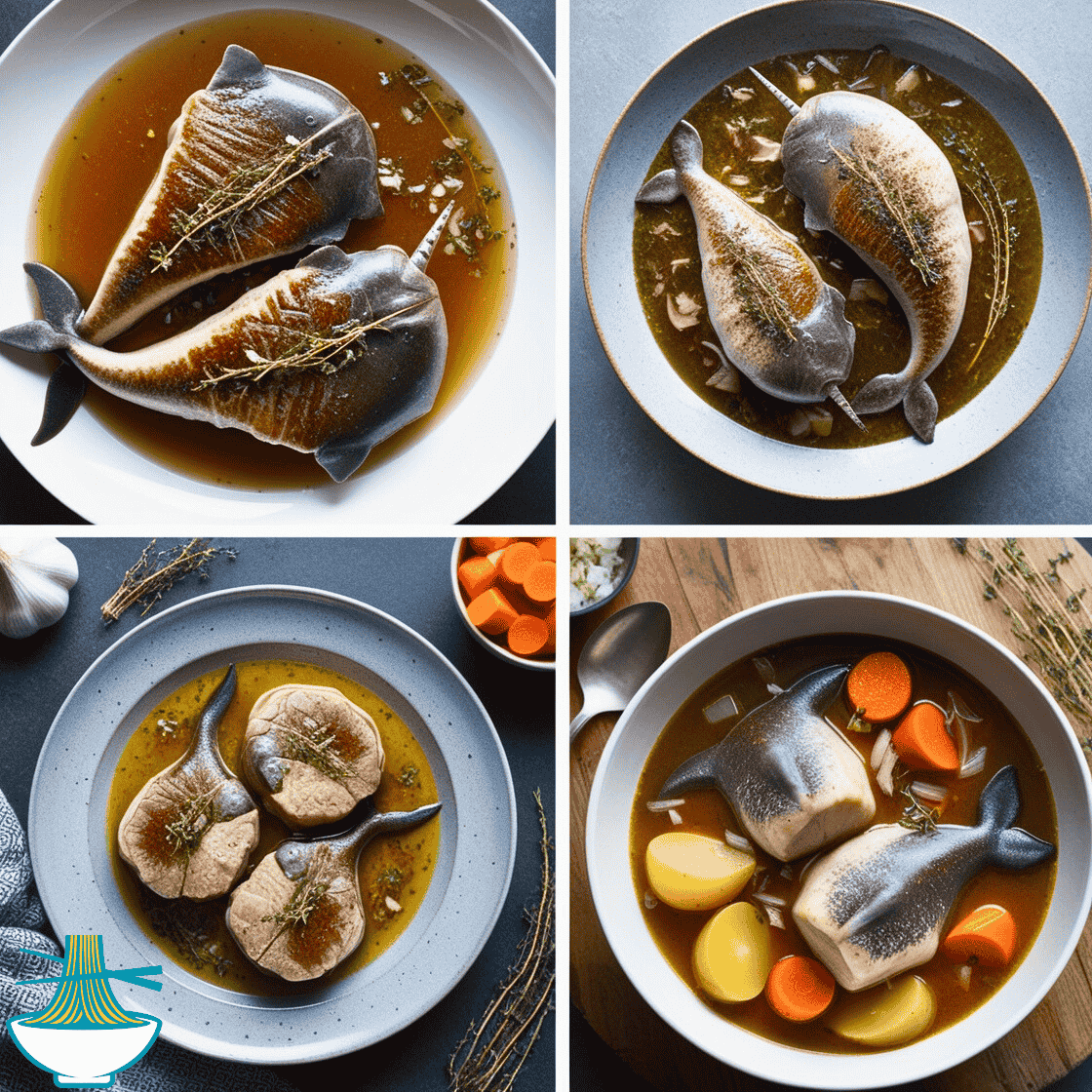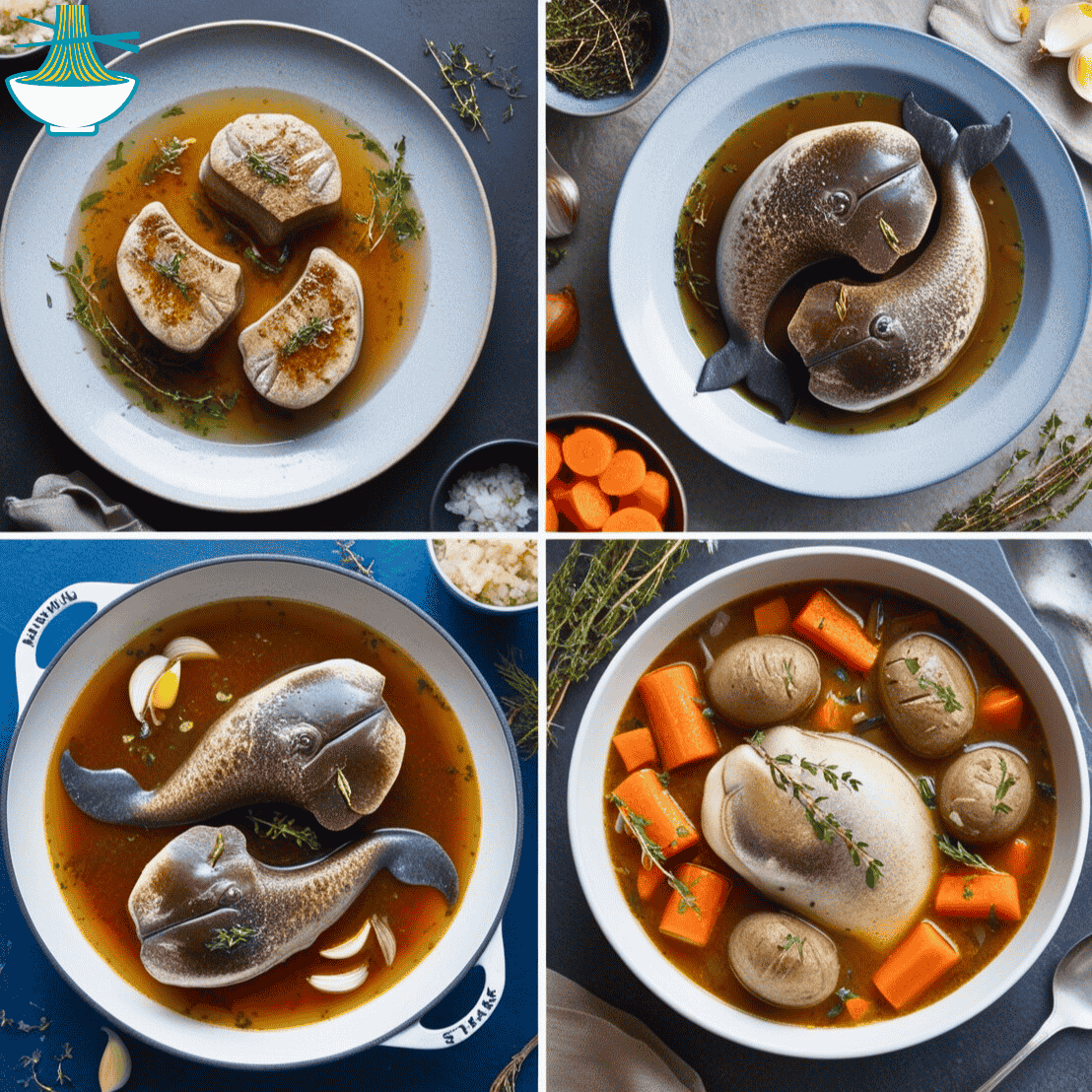Explore the unique flavors of the Arctic with this Greenland Narwhal recipe, featuring two distinct dishes: Narwhal Steaks and Narwhal Stew. The Greenland Narwhal, renowned for its striking spiral tusk, is a symbol of the Arctic's mysterious beauty and resilience. These recipes highlight traditional cooking methods using this culturally significant marine mammal, offering a taste of Greenland's rich culinary heritage.

The Greenland Narwhal, often called the "unicorn of the sea," has long been a vital part of Inuit culture and subsistence. Its meat, highly valued for its rich flavor and nutritional benefits, plays a crucial role in traditional Arctic diets. The use of seal oil in these recipes reflects traditional practices, adding a layer of authentic Arctic flavor. The narwhal’s unique adaptations and solitary behavior have fascinated researchers and locals alike, making it a cherished subject in Arctic exploration.
Ingredients:
For Narwhal Steaks:
- 2 pounds Greenland Narwhal meat, thinly sliced
- 2 tablespoons vegetable oil or seal oil (traditional)
- Salt and pepper to taste
- 2 cloves garlic, minced
- 1 onion, finely chopped
- 1 teaspoon dried thyme
- 1 teaspoon dried rosemary
- 1 cup water or fish broth
For Narwhal Stew:
- 2 pounds Greenland Narwhal meat, cubed
- 2 tablespoons vegetable oil or seal oil (traditional)
- Salt and pepper to taste
- 2 cloves garlic, minced
- 1 onion, finely chopped
- 2 carrots, peeled and diced
- 2 potatoes, peeled and diced
- 1 teaspoon dried thyme
- 1 teaspoon dried rosemary
- 4 cups water or fish broth
Instructions:
Narwhal Steaks:
1. Pat the narwhal steaks dry with paper towels and season both sides with salt and pepper.
2. Heat the vegetable oil or seal oil in a large skillet over medium-high heat.
3. Add the minced garlic and chopped onion to the skillet and sauté until softened and fragrant.
4. Place the seasoned narwhal steaks in the skillet and sear for 3-4 minutes on each side, or until browned.
5. Sprinkle dried thyme and rosemary over the steaks and pour in the water or fish broth.
6. Reduce the heat to low, cover the skillet, and let the steaks simmer for 10-15 minutes, or until cooked through to your desired level of doneness.
7. Serve the narwhal steaks hot, accompanied by your favorite side dishes.
Narwhal Stew:
1. Heat the vegetable oil or seal oil in a large pot over medium heat.
2. Add the minced garlic and chopped onion to the pot and sauté until softened and fragrant.
3. Add the cubed narwhal meat to the pot and season with salt and pepper.
4. Cook the narwhal meat until browned on all sides, stirring occasionally.
5. Stir in the diced carrots and potatoes, along with the dried thyme and rosemary.
6. Pour in the water or fish broth, ensuring that the ingredients are fully submerged.
7. Bring the stew to a boil, then reduce the heat to low and let it simmer, covered, for about 1-2 hours, or until the narwhal meat is tender.
8. Adjust the seasoning if necessary, then ladle the hot narwhal stew into bowls and serve with crusty bread or traditional Inuit flatbread.
Enjoy this hearty and flavorful Greenland Narwhal meal, honoring the traditions and tastes of the Arctic.

Nutrition Value:
1. Narwhal Steaks Ingredients
Greenland Narwhal Meat (2 pounds, thinly sliced)
- Calories: Approximately 200 calories per 3-ounce serving
- Carbohydrates: 0 grams
- Protein: 40 grams per 3-ounce serving
- Fat: 4 grams per 3-ounce serving
- Sodium: 60 milligrams per 3-ounce serving
- Cholesterol: 100 milligrams per 3-ounce serving
- Vitamins: Rich in vitamin B12 and niacin
- Minerals: Good source of iron, phosphorus, and selenium
- Nutritional Benefit: Provides high-quality protein, essential for muscle repair and overall health, and is rich in vital nutrients like iron and vitamin B12, important for red blood cell formation and energy levels.
Vegetable Oil or Seal Oil (2 tablespoons)
- Calories: Approximately 240 calories per 2 tablespoons
- Carbohydrates: 0 grams
- Protein: 0 grams
- Fat: 27 grams per 2 tablespoons
- Sodium: 0 milligrams
- Cholesterol: 0 milligrams
- Vitamins: Contains small amounts of vitamin E (in vegetable oil)
- Minerals: No significant minerals
- Nutritional Benefit: Provides healthy fats, which are essential for energy and supporting cell structure. Seal oil adds omega-3 fatty acids, beneficial for heart health.
Salt and Pepper (to taste)
- Calories: Negligible
- Carbohydrates: Negligible
- Protein: Negligible
- Fat: Negligible
- Sodium: Varies with amount used (salt contains about 2,300 milligrams of sodium per teaspoon)
- Cholesterol: 0 milligrams
- Vitamins: No significant vitamins
- Minerals: Salt provides sodium; pepper contains small amounts of potassium
- Nutritional Benefit: Salt enhances flavor but should be used in moderation to avoid excessive sodium intake. Pepper adds a bit of flavor with minimal nutritional impact.
Garlic (2 cloves, minced)
- Calories: Approximately 8 calories per clove
- Carbohydrates: 2 grams per clove
- Protein: 0.4 grams per clove
- Fat: 0 grams
- Sodium: 1 milligram per clove
- Cholesterol: 0 milligrams
- Vitamins: Good source of vitamin C and B6
- Minerals: Contains manganese, calcium, and iron
- Nutritional Benefit: Offers antioxidants and anti-inflammatory properties, which support immune health and may improve cardiovascular health.
Onion (1, finely chopped)
- Calories: Approximately 45 calories per medium onion
- Carbohydrates: 11 grams per medium onion
- Protein: 1 gram per medium onion
- Fat: 0 grams
- Sodium: 5 milligrams per medium onion
- Cholesterol: 0 milligrams
- Vitamins: Provides vitamin C and B vitamins
- Minerals: Contains potassium, calcium, and magnesium
- Nutritional Benefit: Adds flavor and provides essential nutrients, including vitamins and minerals that support overall health.
Dried Thyme (1 teaspoon)
- Calories: Approximately 6 calories per teaspoon
- Carbohydrates: 1 gram per teaspoon
- Protein: 0.3 grams per teaspoon
- Fat: 0 grams
- Sodium: 1 milligram per teaspoon
- Cholesterol: 0 milligrams
- Vitamins: Contains vitamin C and vitamin A
- Minerals: Good source of iron, calcium, and manganese
- Nutritional Benefit: Provides antioxidants and may support digestive health, respiratory health, and immune function.
Dried Rosemary (1 teaspoon)
- Calories: Approximately 6 calories per teaspoon
- Carbohydrates: 1 gram per teaspoon
- Protein: 0.2 grams per teaspoon
- Fat: 0 grams
- Sodium: 1 milligram per teaspoon
- Cholesterol: 0 milligrams
- Vitamins: Contains vitamin A, vitamin C, and vitamin B6
- Minerals: Provides calcium, iron, and manganese
- Nutritional Benefit: Offers antioxidant and anti-inflammatory properties, which may support cognitive health and improve digestion.
Water or Fish Broth (1 cup)
- Calories: Approximately 15 calories per cup (fish broth can vary)
- Carbohydrates: 0 grams
- Protein: 2 grams per cup (fish broth can vary)
- Fat: 0 grams
- Sodium: 200 milligrams (fish broth can vary)
- Cholesterol: 0 milligrams
- Vitamins: Minimal vitamins
- Minerals: Minimal minerals
- Nutritional Benefit: Adds moisture and flavor; fish broth may provide additional nutrients depending on its preparation.
2. Narwhal Stew Ingredients
Greenland Narwhal Meat (2 pounds, cubed)
- Calories: Approximately 200 calories per 3-ounce serving
- Carbohydrates: 0 grams
- Protein: 40 grams per 3-ounce serving
- Fat: 4 grams per 3-ounce serving
- Sodium: 60 milligrams per 3-ounce serving
- Cholesterol: 100 milligrams per 3-ounce serving
- Vitamins: Rich in vitamin B12 and niacin
- Minerals: Good source of iron, phosphorus, and selenium
- Nutritional Benefit: High-quality protein source, essential for muscle repair and overall health, and rich in vital nutrients like iron and vitamin B12.
Vegetable Oil or Seal Oil (2 tablespoons)
- Calories: Approximately 240 calories per 2 tablespoons
- Carbohydrates: 0 grams
- Protein: 0 grams
- Fat: 27 grams per 2 tablespoons
- Sodium: 0 milligrams
- Cholesterol: 0 milligrams
- Vitamins: Contains small amounts of vitamin E (in vegetable oil)
- Minerals: No significant minerals
- Nutritional Benefit: Provides healthy fats essential for energy and cell structure. Seal oil adds omega-3 fatty acids, beneficial for heart health.
Salt and Pepper (to taste)
- Calories: Negligible
- Carbohydrates: Negligible
- Protein: Negligible
- Fat: Negligible
- Sodium: Varies with amount used (salt contains about 2,300 milligrams of sodium per teaspoon)
- Cholesterol: 0 milligrams
- Vitamins: No significant vitamins
- Minerals: Salt provides sodium; pepper contains small amounts of potassium
- Nutritional Benefit: Enhances flavor but should be used in moderation to avoid excessive sodium intake. Pepper adds flavor with minimal nutritional impact.
Garlic (2 cloves, minced)
- Calories: Approximately 8 calories per clove
- Carbohydrates: 2 grams per clove
- Protein: 0.4 grams per clove
- Fat: 0 grams
- Sodium: 1 milligram per clove
- Cholesterol: 0 milligrams
- Vitamins: Good source of vitamin C and B6
- Minerals: Contains manganese, calcium, and iron
- Nutritional Benefit: Offers antioxidants and anti-inflammatory properties, supporting immune health and cardiovascular health.
Onion (1, finely chopped)
- Calories: Approximately 45 calories per medium onion
- Carbohydrates: 11 grams per medium onion
- Protein: 1 gram per medium onion
- Fat: 0 grams
- Sodium: 5 milligrams per medium onion
- Cholesterol: 0 milligrams
- Vitamins: Provides vitamin C and B vitamins
- Minerals: Contains potassium, calcium, and magnesium
- Nutritional Benefit: Adds flavor and essential nutrients, supporting overall health.
Carrots (2, peeled and diced)
- Calories: Approximately 25 calories per medium carrot
- Carbohydrates: 6 grams per medium carrot
- Protein: 0.5 grams per medium carrot
- Fat: 0 grams
- Sodium: 40 milligrams per medium carrot
- Cholesterol: 0 milligrams
- Vitamins: Rich in vitamin A, vitamin K, and vitamin C
- Minerals: Contains potassium and calcium
- Nutritional Benefit: Excellent source of vitamin A, which supports vision health and immune function, and provides dietary fiber.
Potatoes (2, peeled and diced)
- Calories: Approximately 130 calories per medium potato
- Carbohydrates: 30 grams per medium potato
- Protein: 3 grams per medium potato
- Fat: 0 grams
- Sodium: 10 milligrams per medium potato
- Cholesterol: 0 milligrams
- Vitamins: Contains vitamin C and vitamin B6
- Minerals: Good source of potassium and iron
- Nutritional Benefit: Provides complex carbohydrates for sustained energy, along with important vitamins and minerals.
Dried Thyme (1 teaspoon)
- Calories: Approximately 6 calories per teaspoon
- Carbohydrates: 1 gram per teaspoon
- Protein: 0.3 grams per teaspoon
- Fat: 0 grams
- Sodium: 1 milligram per teaspoon
- Cholesterol: 0 milligrams
- Vitamins: Contains vitamin C and vitamin A
- Minerals: Good source of iron, calcium, and manganese
- Nutritional Benefit: Offers antioxidants and may support digestive and respiratory health.
Dried Rosemary (1 teaspoon)
- Calories: Approximately 6 calories per teaspoon
- Carbohydrates: 1 gram per teaspoon
- Protein: 0.2 grams per teaspoon
- Fat: 0 grams
- Sodium: 1 milligram per teaspoon
- Cholesterol: 0 milligrams
- Vitamins: Contains vitamin A, vitamin C, and vitamin B6
- Minerals: Provides calcium, iron, and manganese
- Nutritional Benefit: Offers antioxidant and anti-inflammatory properties, potentially supporting cognitive and digestive health.
Water or Fish Broth (4 cups)
- Calories: Approximately 15 calories per cup (fish broth can vary)
- Carbohydrates: 0 grams
- Protein: 2 grams per cup (fish broth can vary)
- Fat: 0 grams
- Sodium: 200 milligrams (fish broth can vary)
- Cholesterol: 0 milligrams
- Vitamins: Minimal vitamins
- Minerals: Minimal minerals
- Nutritional Benefit: Adds moisture and flavor; fish broth may contribute additional nutrients depending on preparation.


Comments